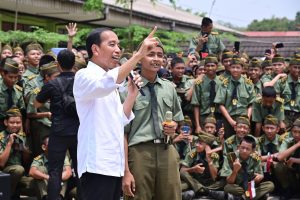As the political horizon of Indonesia’s 2024 election emerges, the stage is set for a confrontation that mirrors the epic Bharatayudha, not in terms of physical conflict but as a battle for the soul and direction of a nation’s leadership. “Bharatayudha,” the Javanese adaptation of the Indian Mahabharata epic, symbolizes a “total war” – an intense, all-out political battle. It conveys the gravity of Indonesia’s upcoming 2024 elections, which could be a pivotal moment for the ruling Indonesian Democratic Party of Struggle (PDI-P), given its recent tensions with President Joko “Jokowi” Widodo.
The roots of this tension can be traced to a perceived drift in Jokowi’s support within his party. A party member who represented the PDI-P at both the 2014 and 2019 elections, Jokowi has seemingly been distancing himself from the PDI-P’s chosen presidential candidate, Ganjar Pranowo, the former governor of Central Java. Despite initially giving signs of support for Ganjar, Jokowi has tacitly supported the decision of his son, Gibran Rakabuming Raka, to join forces with Prabowo Subianto, the current minister of defense and chairman of the Gerindra Party. This alignment, which deviates from the PDI-P’s chosen trajectory, has raised eyebrows and provoked introspection within the party regarding the sanctity of its political ideology and reflects the larger political and ideological rifts between Jokowi and the party.
The political landscape in Indonesia is witnessing a complex scenario. Gibran recently renounced his PDIP membership after two weeks of being announced as Prabowo’s VP candidate, prompted by requests from party administrators in Solo and Central levels. In a twist, Bobby Nasution, Medan’s Mayor, who is not just a PDIP member but also President Jokowi’s son-in-law and Gibran’s brother-in-law, openly supported the Prabowo-Gibran duo over Ganjar Pranowo. His endorsement came into focus when PDIP summoned him and presented a choice: support the party or his family. It seems Nasution might favor family ties over party loyalty, potentially leading to his departure from PDIP. This internal strife has PDIP wary, as pushing Gibran out could inadvertently turn him into a ‘ victim’, a powerful narrative in the country’s political theatre.
The saga has deepened with PDI-P insiders insinuating that Jokowi may have influenced the Constitutional Court’s mid-October ruling that paved the way for Gibran, who is under the minimum age threshold of 40, to run in the February 14 election, as part of his plan to establish a political dynasty. This accusation points to a broader struggle within the party, between those who adhere to the foundational principles of democracy and those who may seek to bend these principles for personal gain or continuity of power. Previous whispers about Jokowi’s aspirations for a third presidential term, contrary to the constitutional limit of two, have fueled the fire of this internal dispute. The PDI-P has stood firm against this, upholding the tenets of the constitution and the democratic mandate it embodies.
The outcome of this political Bharatayudha will have significant implications for Indonesian democracy. It is a battle of ideology versus political expediency, party loyalty versus familial ties. The electorate is tasked with discerning whether the political legacy of a single family should outweigh the collective narrative of a political movement that has historically stood for the people’s interest.
As Indonesia looks to next year’s election and beyond, the unfolding drama between Jokowi and PDI-P has serious implications for both sides. For Jokowi, the situation is fraught with peril and opportunity. On the one hand, his support for Gibran signals a potential shift towards a more dynastic political culture, which Indonesia has struggled to shed during its post-Suharto reform era. On the other hand, his actions might be interpreted as a pragmatic response to the shifting landscape of Indonesian politics, where traditional party structures and allegiances are being questioned, and new coalitions are being formed. How he navigates this political impasse will define his legacy.
For the PDI-P, the rift has prompted internal ideological soul-searching. This tension between tradition and modernity, between established norms and emerging realities, is playing out in the context of a party that has been at the forefront of Indonesia’s democratic evolution. The PDI-P must now decide whether to confront Jokowi’s moves head-on or to seek a more conciliatory path that preserves party unity while still upholding its democratic values. It’s a delicate balancing act that requires both political acumen and a steadfast commitment to the party’s foundational ideals.
The PDI-P’s handling of this situation will also have broader implications for Indonesia’s political parties. It will set a precedent for how they manage internal dissent and navigate the complex relationship between individual leaders and party ideology. The outcome will influence how parties across the political spectrum position themselves and respond to leadership and governance challenges.
In conclusion, the Bharatayudha between Jokowi and the PDI-P is more than a political rivalry; it is a crucible in which the maturity and robustness of Indonesian democracy will be tested. It is an opportunity for the renewal and reaffirmation of democratic values, for a recommitment to the principles of transparency, accountability, and collective leadership. How this battle is waged and won will resonate far beyond the 2024 elections, setting the tone for Indonesia’s democratic journey for decades to come.

































